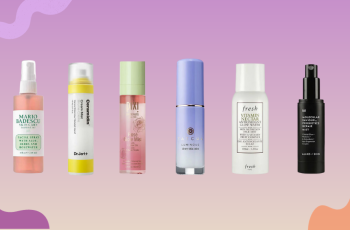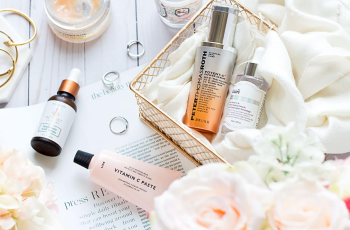
Between deciphering arcane scientific ingredients and explaining concentration percentages, reading skincare labels can be so intimidating that you’ll panic and buy whatever product is currently topping Sephora’s bestseller list.
If the mere thought of looking at the back of your moisturizer makes you nervous, we can assure you that figuring out what you’re putting on your face isn’t completely impossible.
Let’s take niacinamide, for example. To learn more about one of the most common ingredients in skincare, we asked dermatologist Dr. Jennifer Herrmann, MD, FAD, all of our burning questions.
Here, the dermatologist breaks down everything you need to know about niacinamide creams, including a $16 drugstore cream that’s perfect for sensitive, acne-prone skin.
What is niacinamide?
Niacinamide is a multi-tasking vitamin. When applied topically, it can soothe skin sensitivity, build healthy skin cells, and keep skin hydrated, according to Herrmann.
“Niacinamide is a water-soluble form of vitamin B3 that has a variety of uses in dermatology, from preventing skin cancer to relieving redness caused by inflammatory conditions such as rosacea and acne,” she explains.
Benefits for Skin Care
The benefits depend on the niacinamide dosage form chosen, Herrmann explains: “This oral vitamin is very safe and well tolerated and has been shown to significantly reduce the incidence of basal cell and squamous cell carcinomas of the skin by promoting DNA repair.
This ultimately gives us a skin cancer prevention option that goes beyond sunscreen and sun-protective clothing.”
“Topical niacinamide can help clear acne, reduce discoloration, and prevent skin aging and moisture loss,” she explains. For acne, niacinamide’s anti-inflammatory and sebum-suppressing properties are crucial.
In the case of skin discoloration, it helps prevent the transfer of skin pigment, thereby reducing brown spots, according to Herrmann. Studies show that niacinamide can also help with anti-aging, reducing fine lines and skin blotchiness.
Which niacinamide product is right for me?
“Niacinamide is relatively safe to take orally and topically,” Herman says. When shopping for niacinamide products, she recommends checking product labels carefully to make sure your skin won’t react to other ingredients.
“If you have sensitive or oily skin, be sure to pay attention to the other ingredients in niacinamide products,” she explains. “For example, too much oil can worsen acne, and alcohol can irritate sensitive skin.”
Dermatologist-Recommended Niacinamide Products
Below, Herman breaks down her favorite niacinamide products—from inexpensive drugstore products to serums that promise serious results.
DNA Regenerating Skincare Formula
“This morning supplement boosts your DNA repair process, effectively counteracts sun and environmental damage, and promotes anti-inflammatory and antioxidant responses,” Herman explains.
“It contains turmeric, folic acid, tragacanth gum, mustard seed extract, milk thistle extract, and Polypodium vulgare (a natural oral sunscreen).”
SkinMedica Lytera 2.0 Pigment Correction Serum
“I definitely recommend this if you’re looking to reduce unwanted pigmentation spots,” Herman says. “Although it’s pricey, it contains tranexamic acid, resorcinol, and marine extracts that work synergistically to brighten your complexion.”
CeraVe Moisturizing Night Cream
“This lotion is particularly effective and great for sensitive and acne-prone skin,” Herman says. “The hyaluronic acid and ceramides help repair the skin barrier while providing hydration.”
100% Pure Multivitamin and Antioxidant Serum for Nighttime Use
“It combines niacinamide, vitamins C and E, retinol, and coenzyme Q10 for excellent anti-aging and skin-brightening benefits,” recommends Herman.
DNA Renewal Skincare Nox Blend
“This night serum is the perfect combination of melatonin, valerian root, and lemon balm extracts to help you get your beauty sleep started. It repairs your skin from the inside out while you sleep, so you don’t feel groggy or dizzy the next day,” says Herman.

